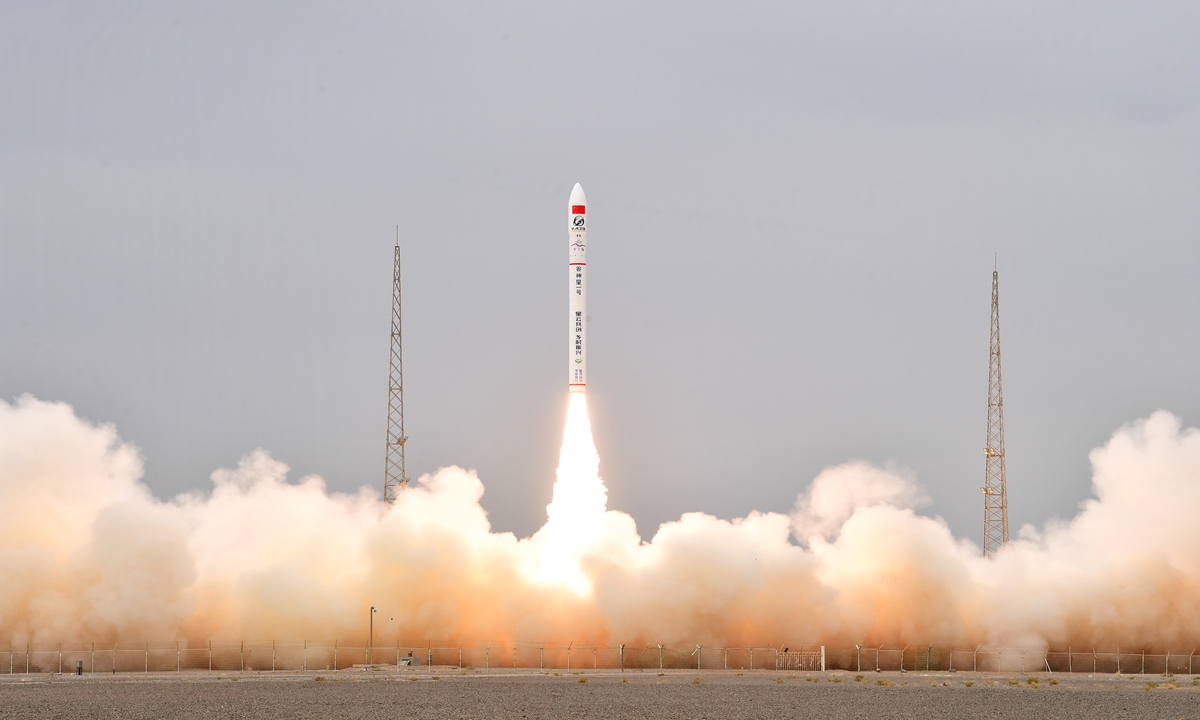
Private Chinese aerospace firm Galactic Energy launches its eighth Ceres 1 rocket on Friday, successfully sending Jilin-1 Kuanfu 02A satellite to its preset orbit. Photo: Courtesy of Galactic Energy
Chinese private rocket firm Galactic Energy has completed investigation of a recent launch failure, the first for the start-up after nine successful orbital launches in a row. The company said it will ramp up efforts on quality control in the future.
Gaining altitude for about 67.5 seconds after lift-off from the Jiuquan Satellite Launch Center in Northwest China on September 21, Galactic Energy's mature rocket model Ceres 1 rocket was unstable in attitude and failed to reach orbit.
The flight failure is due to abnormal ablation in the expansion section of the first-stage engine nozzle. The ablation stemmed from internal defects in the carbon cloth layer as a result of improper operation in the process of assembly for the screw holes in the expansion section, according to the company's official WeChat account on Tuesday.
To resolve the issue, the space firm has guided upstream suppliers to adopt a number of measures such as improving operating procedures, refining operating requirements, strengthening operating procedure training, and optimizing production process inspections in order to improve the quality control of each production process.
Aerospace is a high-investment, high-risk undertaking, and any neglect of quality will cause irreparable losses, the company said, vowing to implement improvement measures and undertake follow-up flying missions in a steady and reliable way.
"We'll go deep into every production link to strictly control every detail in a bid to ensure that subsequent launch missions are flawless," it added.
The launch failure in September is the first for Galactic Energy, deemed as a Chinese private space start-up that has the most stable performance since its first successful orbital launch in November 2020.
The mishap was also the first for China so far this year, which had been riding a streak of 43 consecutive launch successes in 2023, according to SpaceNews.
The Beijing-based start-up has put 33 commercial satellites to the orbit for its clients using the Ceres 1 rocket, a four-stage launch vehicle independently designed by Galactic Energy. Solid engines are used in the first, second and third stages, while advanced liquid upper stage is used in the fourth.
Apart from its first three launches, Galactic Energy's other missions were intensively completed within 10 months starting from November 2022, the high launch density of which singled the firm out among its peers.
Notably, in early September, the company achieved its first-ever sea launch in the Yellow Sea offshore East China's Shandong Province, successfully deploying four satellites into pre-set orbits, being the first private firm in China to achieve the milestone.
Despite the recent launch failure, the achievements made by domestic space players remained highly impressive, industry observers said.
Yang Yuguang, vice chair of Space Transportation Committee at the International Astronautical Federation, told the Global Times that the private segment's rapid development is partially due to experienced talent, some of whom would like to move out of mature state-owned aerospace system to emerging start-ups as well as the booming demand for satellite launches in the market.
Apart from the increase in the launches, Chinese private space players have also demonstrated robust innovation capabilities and potential, propelling their technology iteration, Yang said.
In July, LandSpace, another private rocket start-up, launched the world's first liquid oxygen, liquid methane carrier rocket from Jiuquan site - a milestone that put China at the forefront of the global space race for methane-based rockets.
Global Times




